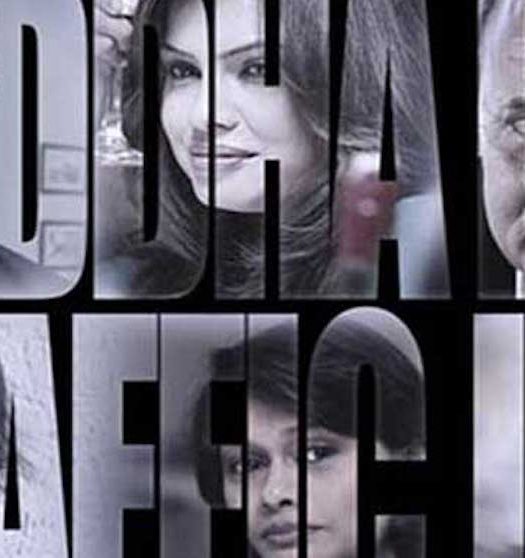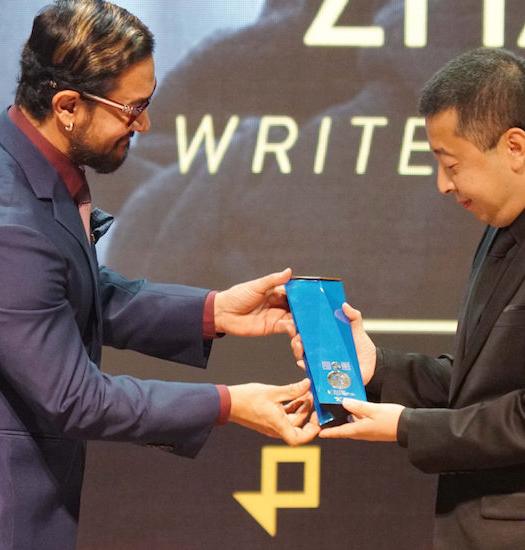Childhood Symphonies
As children we are always in a hurry to grow up and do grown up things. As adults when we see children playing, we reminisce our childhood, deeply inhaling memories of the pleasure we felt while riding swings and making odd mud castles. It’s said that there is something pure and innocent about children that makes their experiences magical. This must be true because every children – centric song that we picked here has something visually and sonically magical about them.
Lakdi Ki Kathi

We have heard this song time and again. The songs played to kids may have changed over time with the changing phases of Bollywood but this is a golden tune. This song from the movie Masoom, featured then child actors Urmila Matondkar and Jugal Hansraj in their little star avtaar. The song became a huge hit and the movie was critically acclaimed. It was the visual image of riding on a wooden horse that made us all swoon to the song as kids and makes us nostalgic as adults. Directed by Shekhar Kapur, starring Shabana Azmi and Naseeruddin Shah, the film’s story while powerful made the significance of this song more impactful.
Trivia: This was not the only movie where Shabana and Urmila played mother and daughter. The other movie was Tehzaab.
Ichak Dana Bichak Dana

This song got international recognition especially in countries like Israel and Russia. I remember an old grandma singing this to me in Russia on my visit there. It was her favourite song from India and Raj Kapoor, her favourite actor. She said this blushing as she mentioned Raj Kapoor’s name. With a sweet melody and zig-zag rhyme lyrics, the song sticks to your brain and you can hear yourself humming it after a listen. The power of nursery rhyme-like songs is huge. Apparently, Iranian people refer to Indians as “Ichak Dana”. The lyrics of the song were penned by Hasrat Jaipuri while it was composed by Shankar-Jaikishan. It was feared that the Censor Board may ban this song because of people talking about the “other meaning” of ‘Danne Upar Daana’. However nothing of the sort really happened and till date it is one of the most popular children’s songs.
Trivia: In Israel, the song was recorded by a local star Naim Rajuan.
Humko Man Ki Shakti Dena

This is a classic from the 1971 movie Guddi. The song inevitably gives you a divine feeling of strength and solidarity. It has been sung as a morning prayer in many schools across India. Written by Gulzar, composed by the late legendary musician Vasant Desai and sung by child artist Vani Jayaram, the song won many national awards at the time. Lines such as ‘Doosron ke jai se pehle khud ko jai kare’ has a deeper underlying meaning that points at how we as humans must clear our tainted hearts and minds before trying to help others clear theirs. It also means how people have to first correct their own mistakes before pointing fingers at others. These are sayings from various religious texts which through the song, translate into a simpler and a more universal message.
Trivia: This song is in the classical raga “Kedar”
Anjali Anjali Anjali

This was a riot of a movie that I bet left a lasting impression on every person who saw it. Everything about the movie was fresh; from the actors to the theme of the story. It was heartwarming to watch the display of empathy, love, care and strength especially among kids that age. Directed by Mani Ratnam, the film was originally made in Tamil and later dubbed in Hindi and Telugu. The film in brief is about a mentally disabled child whose family deals with the emotional trauma of the situation. Not by any stretch a light watch, though a movie that has many kids, it really is a film that all parents must watch. It is definitely not for the faint-hearted but it’s not worth missing out on all the cute, funny, strange and magnificent moments. The song ‘Anjali Anjali Anjali’ is pictured on the child protagonist and her little tricks.
Trivia: The child artist Shamili who plays Anjali in the movie is the younger sister of the film actor Shalini. Shamili excelled as a child actor but not so much later on.
READ: 7 BOLLYWOOD FILMS WITHOUT ANY SINGING AND DANCING
Nanhe Munhe Bache Teri Muthi Mein Kya Hai

This song from Boot Polish that excelled in cinematic experience had a gem of a song that has stayed immortal in Bollywood. It’s a reminder that kids should grow up knowing that they can control what lies ahead of them because they have their fate in their hands. A song parents would play to their kids in the olden days to remind them that they alone control their destinies. The hope and the true living that the song invokes is priceless.
Trivia: Raj Kapoor wanted to take Baby Naaz under his wing and groom her to launch her in the movies. Her mother did not accept the fact that this would mean she won’t be in the movies until she was formally launched.
Hum Bhi Agar Bache Hote

From the film Door Ki Awaz, Mohammad Rafi’s sweet, lilting voice sounds like honey. The song evokes fond childhood memories even for someone who has heard it as a grown up and hasn’t necessarily been attached to the song in anyway. That’s the sign of a great song; you can relate to it without knowing the context or the background of the song. The song is part of the scene where Saira Banu and Joy Mukherjee plan a birthday party for their three-year-old son and Johnnie Walker comes and sings ‘Hum bhi agar bachche hote’. It definitely takes us down memory lane to those lovely birthday parties we had as children. This song was played on Doordarshan along with other classics such as ‘Nanna munna rahi hu’ and ‘Dadi amma dadi amma maan jao’ on Children’s Day programs.
Trivia: Joy Mukherjee and Saira Banu starred in three other Bollywood movies together- Shagird, Saaz Aur Awaaz, Aao Pyar Karen.
Maa

Taare Zameen Par is a more contemporary version of Anjali but not as crazy an emotional roller-coaster ride as the latter. It looks at the problems that parents of a child suffering from dyslexia go through as well as the child’s plight and trouble in trying to adjust to regular life. ‘Maa‘ is a sensitive expression of a special bond between the mother and son; it’s show how deeply only mothers can relate to the pain her child is going through. It’s such a powerful message of love; unconditional love which probably only exists in the purest form between a mother and her child. It speaks about a child’s insecurities and fears and sensitively but with much power touches your deepest core.
Trivia: Abhishek Bachchan’s experience as a child suffering from dyslexia has been used in the film.
Disclaimer: The opinions expressed within this POV/BLOG are the personal opinions of the author. PANDOLIN is not responsible for the accuracy, completeness, suitability, or validity of any information on this blog. All information is provided on an as-is basis. The information, facts or opinions appearing on the POV/BLOG do not reflect the views of PANDOLIN and PANDOLIN does not assume any responsibility or liability for the same.



